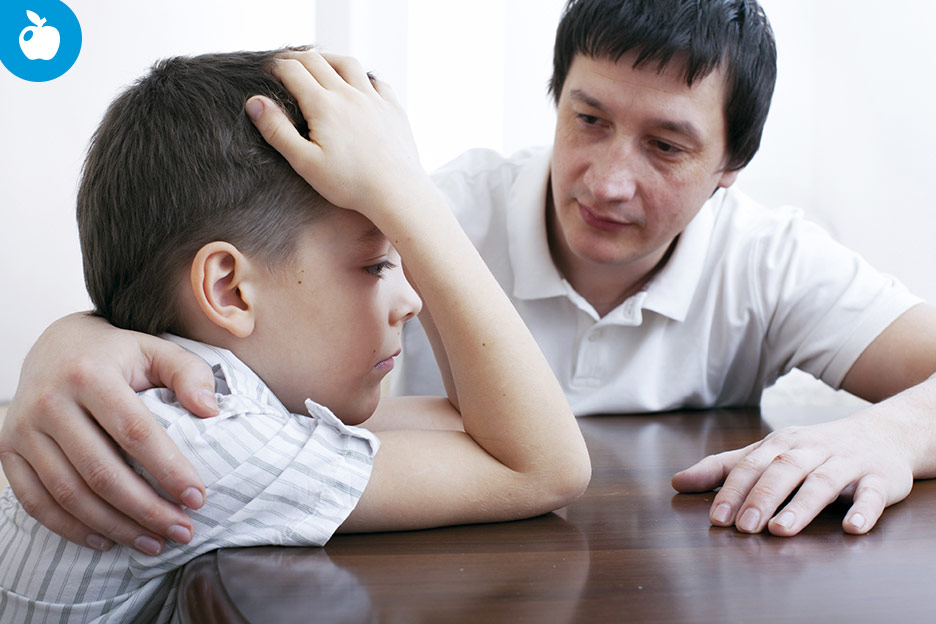Gastro-enteritis, carsickness, food poisoning… whatever the cause, nausea and vomiting are often par for the course in childhood. But what should you do to make your little one feel better?

Causes
Nausea and vomiting can be unsettling for children and worrisome for parents. Although very unpleasant, these are actually a normal physiological phenomenon that is usually temporary and harmless. However, you should keep a close eye on the situation since nausea and vomiting can hide more significant problems and lead to complications.
More often than not, the words nausea and vomiting lead us to assume that the child has an illness all parents dread: gastro-enteritis. Highly contagious, this illness occasionally rears its ugly head and causes chaos in a household by spreading from one family member to another. Although this infection does indeed cause nausea and vomiting in children, there are other possible causes. For example:
- carsickness;
- stress, nerves;
- food poisoning;
- food intolerance;
- other infections;
- certain medications;
- headache;
- digestive diseases;
- etc.
Nausea and vomiting can occur separately, but are most often closely linked. Nausea is a sensation of discomfort that indicates you may possibly vomit. For its part, vomiting is the expulsion of stomach contents through the mouth.
The main consequence: dehydration
When your child vomits, he or she loses liquid and electrolytes, which may cause dehydration. Infants are especially at risk of getting dehydrated. These are the signs and symptoms of dehydration you should watch for if your child is vomiting:
- dry mouth, tongue and skin;
- crying without tears;
- increased thirst;
- decreased urine;
- drowsiness or irritability;
- sunken eyes;
- greyish skin;
- sunken fontanel (soft spot on the baby’s head).
To prevent and treat dehydration caused by vomiting, it is important for the child to replenish what has been lost. To do so, you can give him or her an oral rehydration solution, available at the pharmacy, which contains water, electrolytes and sugar. Before purchasing one, seek the help of your pharmacist, who will advise you on the quantities to administer according to your child’s weight and severity of the situation. You may also be tempted to give your child medication to relieve nausea, but doing so, especially for young children, is not advisable, unless recommended by a doctor. Always ask your pharmacist for guidance before giving your child over-the-counter medication.
When to see a doctor
In general, nausea and vomiting are mild and temporary afflictions. However, they can occasionally be the symptoms of a more serious problem and lead to complications. You must therefore remain attentive and see a doctor if necessary. Here are a few examples of situations that require a medical consultation:
- your child is showing signs and symptoms of dehydration;
- your child is irritable or sleepy;
- your child vomits frequently, and for over 4 to 6 hours;
- your child vomits after a head injury;
- your child’s belly is hard, swollen or painful between bouts of vomiting;
- your child is vomiting blood or liquid containing small, blacks specks (like coffee grounds).
When in doubt, don’t hesitate to consult your pharmacist. He or she will ask you a few questions and help you make the right decision. Depending on what is causing the nausea and vomiting, he or she will recommend measures to prevent them (for example, carsickness).
If nausea and vomiting occur while the pharmacy is closed, you can also call the Info-Santé health line. You will be able to speak with a health-care worker who will advise you on the appropriate measures to follow.
Nausea and vomiting are upsetting for both young and old, but we feel especially powerless when they affect our little ones. With proper treatment, support and careful monitoring, you can help them get back on their feet as soon as possible!
